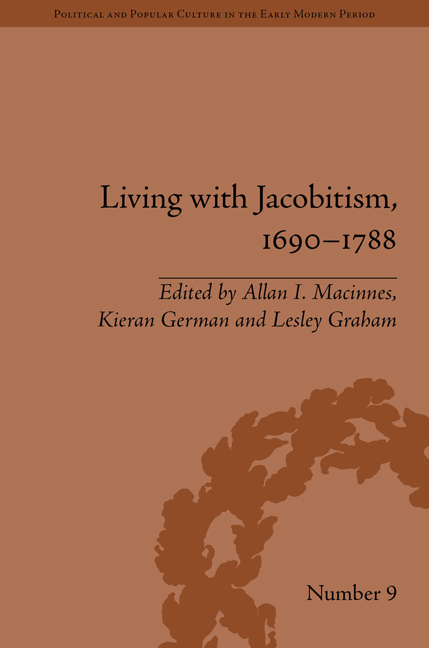Book contents
- Frontmatter
- CONTENTS
- List of Contributors
- List of Figures
- Abbreviations
- Preface: Breandán Ó Buachalla, A Tribute
- Introduction: Living with Jacobitism
- 1 The First Jacobite and the Scottish Parliament
- 2 The Scottish Jacobite Community at Saint-Germain after the Departure of the Stuart Court
- 3 Liturgy: The Sacramental Soul of Jacobitism
- 4 ‘Zealous in the Defence of the Protestant Religion and Liberty’: The Making of Whig Scotland, c. 1688–c. 1746
- 5 Jonathan Swift's Memoirs of a Jacobite
- 6 ‘Female Rebels’: The Female Figure in Anti-Jacobite Propaganda
- 7 Commerce and the Jacobite Court: Scottish Migrants in France,1688–1718
- 8 Ultramontane Ultras: The Intellectual Character of Irish Students at the University of Paris
- 9 To a Fair Meeting on the Green: The Order of Toboso and Jacobite Fraternalism, 1726–c. 1739
- 10 English and Scottish Jacobite Painters in Eighteenth-Century Rome
- 11 Polite War: Material Culture of the Jacobite Era, 1688–1760
- 12 Robert Adam: ‘My Mother's Dear British Boy’
- 13 From Jacobite to Jacobin: Robert Watson's Life in Opposition
- 14 Robert Louis Stevenson's ‘The Young Chevalier’: Unimagined Space
- Notes
- Index
6 - ‘Female Rebels’: The Female Figure in Anti-Jacobite Propaganda
- Frontmatter
- CONTENTS
- List of Contributors
- List of Figures
- Abbreviations
- Preface: Breandán Ó Buachalla, A Tribute
- Introduction: Living with Jacobitism
- 1 The First Jacobite and the Scottish Parliament
- 2 The Scottish Jacobite Community at Saint-Germain after the Departure of the Stuart Court
- 3 Liturgy: The Sacramental Soul of Jacobitism
- 4 ‘Zealous in the Defence of the Protestant Religion and Liberty’: The Making of Whig Scotland, c. 1688–c. 1746
- 5 Jonathan Swift's Memoirs of a Jacobite
- 6 ‘Female Rebels’: The Female Figure in Anti-Jacobite Propaganda
- 7 Commerce and the Jacobite Court: Scottish Migrants in France,1688–1718
- 8 Ultramontane Ultras: The Intellectual Character of Irish Students at the University of Paris
- 9 To a Fair Meeting on the Green: The Order of Toboso and Jacobite Fraternalism, 1726–c. 1739
- 10 English and Scottish Jacobite Painters in Eighteenth-Century Rome
- 11 Polite War: Material Culture of the Jacobite Era, 1688–1760
- 12 Robert Adam: ‘My Mother's Dear British Boy’
- 13 From Jacobite to Jacobin: Robert Watson's Life in Opposition
- 14 Robert Louis Stevenson's ‘The Young Chevalier’: Unimagined Space
- Notes
- Index
Summary
The presence of female figures in anti-Jacobite propaganda during the rising of 1745 has often been noted. In some texts, only a passing reference is made to the strong presence of women within Jacobite ranks, as the following example taken from the Penny London Post testifies: ‘It is reported that during the Engagement there were about 150 Women bore Arms, and behaved in a most surprising Manner’. But in others, usually articles or memoirs, the female figure is central. In the latter case, one or more female characters – usually women of rank – become the very elements on which the anti-Jacobite dimension of the text hinges.
What is striking about Jacobite heroines in Hanoverian texts is how outrageous they are, since they seem to overstep every boundary of propriety – Jenny Cameron, for instance, makes passes at men or even dresses like them, and in some sources she even becomes a military leader. She seems larger than life because she is an artificial construct, drawing more from traditional female antitypes than from the real woman whose name she has been given. These chatacters were not complete fabrications but were loosely based on real Jacobite women such as Margaret Ogilvy, Jane Drummond, the dowager Duchess of Perth, and Jean Cameron. The three women took part in the 1745 rising in very different capacities.
- Type
- Chapter
- Information
- Living with Jacobitism, 1690–1788The Three Kingdoms and Beyond, pp. 85 - 98Publisher: Pickering & ChattoFirst published in: 2014



